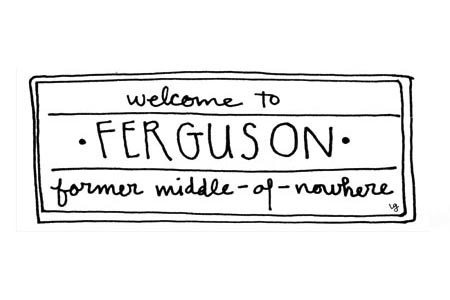The chain stores guided me. Left turn after the Steak and Shake, past the Shop and Save, right turn in front of the Jack in the Box, roll through a few more strip malls before reaching a quiet cul-de-sac. Welcome to Ferguson, Mo. Happy Thanksgiving.
Every year, my family travels from around the Midwest to this suburb of St. Louis, where my aunt and uncle have lived in the same mid-sized ranch house for over 30 years.
Thanksgiving is usually an event unto itself, separated from a specific time and place by the simple joy of getting together with people you rarely see but have known your entire life. In many ways, this year’s festivities weren’t much different.
The conversation flowed as it always does. We talked about sports, movies and our lives. The post-grads held up in gushing tones the egalitarian god of “logistics,” while the Baby Boomers wanted to know how to pronounce “Zach Galifianakis.” Amidst it all, however, there was a sense of unease — an air of frustration knowing that the town outside was still burning.
Full disclosure: My extended family is far from wealthy, but we are white. Even so, you could see the emotional toll the past few months have taken on my relatives. They aren’t protesters, but their neighbors are. They aren’t cops, but their neighbors are. They aren’t black, but their neighbors are.
As the traditional meal of turkey and Bud Heavy died down, Darren Wilson and Michael Brown came to the fore. The same conversation was held this Thanksgiving all around the nation, I’m sure, but with less urgency and pain.
For a family that prides itself on progressivism, one whose former patriarch integrated the area’s schools as superintendent, parsing out the issue was a struggle. Most everyone agreed that “change” is needed, but they were unsure of their own implicit role in the protests. The “I Love Ferguson” sign in the front yard was a plea for normalcy.
Newsreels, Facebook statuses and on-campus debates have stamped the town into different factions based on their own interests. None of it fit with my personal experience of it.
Ferguson is, above all, not much. A faceless suburb dominated by open, unending roads, whose main attraction is its proximity to other places. When you talk about Ferguson, you’re really talking about St. Louis County as a whole. And when you do that, you’re evoking patterns of discrimination that affect most every district and ward from sea to shining sea. You could even be talking about Williamsburg.
You don’t come to Ferguson for answers, but you can’t come to Ferguson without asking questions. These questions are not simple, partially because folks like my relatives are not evil.
Thanksgiving in Ferguson reinforced the root problem at the heart of modern America: a hollowing out of the American Dream largely along racial lines, which well-intentioned men and women can only watch.
The only easy answers at the dinner table were for more food and less violence.
Email Jack Powers at jbpowers@email.wm.edu


Thank you for sharing your story Jack. I am happy you are part of the W&M family and provided a unique perspective.